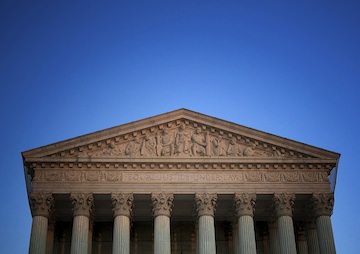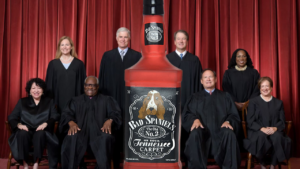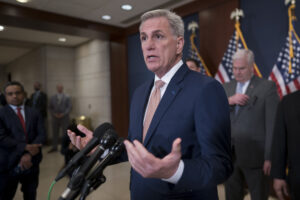A Handful of Corporate Lawyers Have the Supreme Court’s Ear
The marble facade of the U.S. Supreme Court bears the words "Equal Justice Under Law," but an elite group of attorneys has emerged as first among equals, and they represent corporations, not people. Photo by GabbiSchaffzin (CC BY 2.0)
Photo by GabbiSchaffzin (CC BY 2.0)
Photo by GabbiSchaffzin (CC BY 2.0)
The marble facade of the U.S. Supreme Court bears the words “Equal Justice Under Law,” but an elite group of attorneys has emerged as first among equals, and they represent corporations, not people.
A Dec. 8 report on Reuters’ examination of the top court’s docket, the most comprehensive of its kind ever performed, described today’s Supreme Court as “a place where an elite group of jurists embraces an elite group of lawyers who reinforce narrow views of how the law should be construed”:
A Reuters examination of nine years of cases shows that 66 of the 17,000 lawyers who petitioned the Supreme Court succeeded at getting their clients’ appeals heard at a remarkable rate. Their appeals were at least six times more likely to be accepted by the court than were all others filed by private lawyers during that period.
The lawyers are the most influential members of one of the most powerful specialties in America: the business of practicing before the Supreme Court. None of these lawyers is a household name. But many are familiar to the nine justices. That’s because about half worked for justices past or present, and some socialize with them.
They are the elite of the elite: Although they account for far less than 1 percent of lawyers who filed appeals to the Supreme Court, these attorneys were involved in 43 percent of the cases the high court chose to decide from 2004 through 2012.
Of the 66 lawyers mentioned above, 51 worked for law firms that primarily represent business interests. This means that over time corporate America cultivates a small pool of lawyers who are better able to get cases before the Supreme Court than any other attorneys in the country. And they acknowledge that they avoid taking cases from individuals seeking to challenge their high-paying corporate clients, whose activities and concerns are generally entangled and embedded throughout society.
Individuals seeking to challenge large businesses are left to choose from a smaller pool of less experienced and less successful lawyers.
Reuters continues:
An elite firm might refuse to represent an individual suing a corporation on a labor issue, for example, because it fears that winning the case could create a precedent that might hurt top clients in other industries. Large firms do take cases pro bono on behalf of the indigent. But those appeals are generally related to criminal law or social causes such as gay marriage – topics unlikely to affect U.S. business interests.
For many top firms, the conflicts mean declining to represent environmental organizations, labor unions, employees suing employers, or consumers filing class actions.
Joseph Sellers, a lawyer for the midsized firm Cohen Milstein who argued a Supreme Court case against Wal-Mart and for a class of more than 1.5 million female employees who alleged gender discrimination, said, “It’s not that there aren’t lawyers at these large firms who aren’t public-spirit minded and don’t want to do these cases. It’s that their business model won’t allow it.
“In terms of access to justice, the ability of individuals to get their issues raised in the Supreme Court is more limited,” he continued. “Our side just doesn’t have the resources.”
Ashley Parrish, a partner at the law firm King & Spalding whose success rate in getting cases before the court puts him among the most elite lawyers in America, told Reuters, “Working for corporate clients is the bread and butter of our practice. … As a large national firm, we are generally conflicted from representing individuals and advocacy groups in litigation against corporations. … They are typically suing our clients or prospective clients.”
Michael Luttig, general counsel for aerospace giant Boeing Co., said of the new class of lawyers who are intimate with the Supreme Court, “It has become a guild, a narrow group of elite justices and elite counsel talking to each other.” The court and its elite bar have grown “detached and isolated from the real world, ultimately at the price of the healthy and proper development of the law.”
In exclusive interviews with Reuters, many of the Supreme Court justices acknowledged the growing specialization of the Supreme Court’s bar. And they largely welcome it. Reuters reported, “They speak glowingly of the repeat performers, explaining that elite lawyers help them understand and sift through complex legal issues.” Retired Justice John Paul Stevens explained, “They earn respect by their performances. And because they have respect, they are more successful. I am not aware of any downside.”
Read the full series of reports here.
— Posted by Alexander Reed Kelly.
Your support matters…Independent journalism is under threat and overshadowed by heavily funded mainstream media.
You can help level the playing field. Become a member.
Your tax-deductible contribution keeps us digging beneath the headlines to give you thought-provoking, investigative reporting and analysis that unearths what's really happening- without compromise.
Give today to support our courageous, independent journalists.









You need to be a supporter to comment.
There are currently no responses to this article.
Be the first to respond.